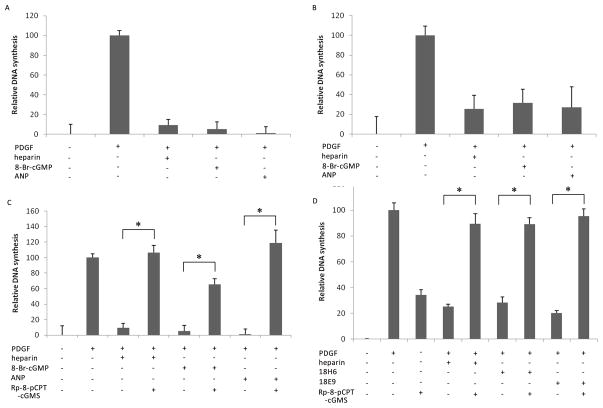Figure 1.
cGMP mimics heparin and PKG inhibition blocks heparin effects on VSMC DNA synthesis. A7r5 VSMC (A, C, D) and porcine VSMC (B) were grown to approximately 60% confluence and synchronized by starvation. Cells were incubated with 20 μM BrdU for at least four hours and inhibitors were added (200 μg/ml heparin [n = 5 in A, 6 in B], 100 μM 8-Br-cGMP [n = 4 in A, 3 in B], 100 nM ANP [n = 3 in A, 3 in B]. After 10 min, 1.5 μg/ml PDGF was added. After 48 h incubation, cells were fixed and the percentage of the total cells demonstrating BrdU incorporation was measured histochemically. The values reported reflect the average (± SE) relative BrdU incorporation from separate experiments compared to non-treated controls (0%) and PDGF treatments (100%). All three treatments in A and B blocked PDGF-stimulated DNA synthesis (p < 0.0001). For panel C, indicated samples were pretreated with 2 μM Rp-8-pCPT-cGMS for 20 min prior to the PDGF addition (n=3). Inhibition of PKG with Rp-8-pCPT-cGMS prevented the effects of anti-proliferative agents (heparin, 8-Br-cGMP & ANP) on PDGF-stimulated DNA synthesis (p < 0.0001, 0.0002, and 0.0028, respectively). For panel D, anti-heparin receptor antibodies (18H6 or 18E9, 0.8 μg/ml) were added to some cells, as noted. Rp-8-pCPT-cGMS was added, as described for panel C. The inhibitor blocked the anti-heparin receptor antibody effects on BrdU incorporation (p < 0.0001). Comparisons with significant differences are noted by *.

